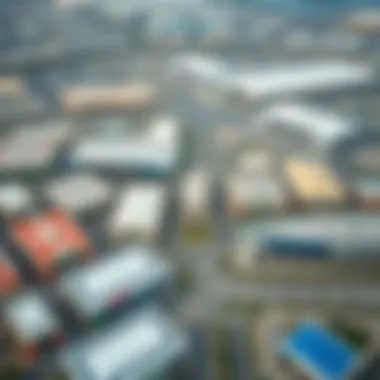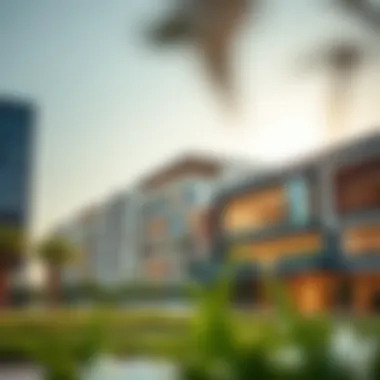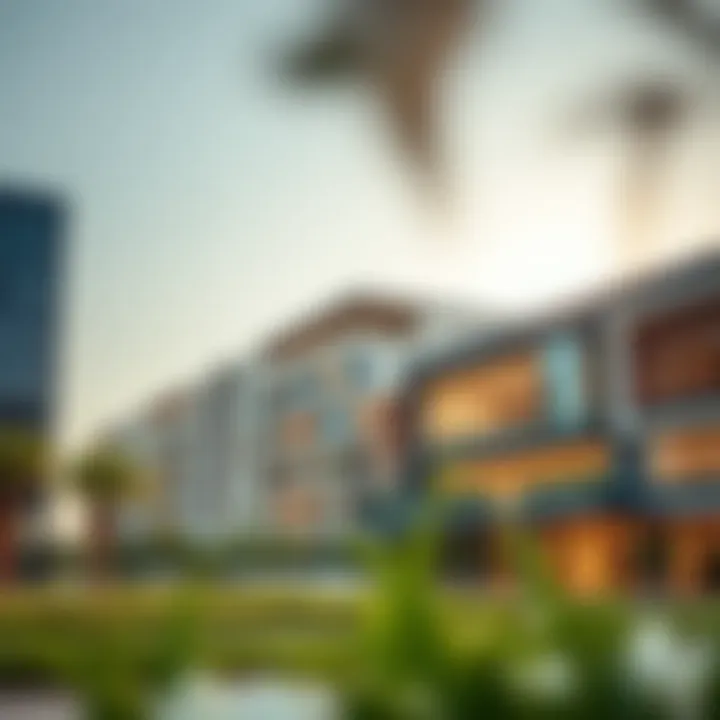Exploring Dubai Investment Park: Opportunities and Insights


Intro
Dubai Investment Park (DIP) stands as a testament to the ambitious strides made by Dubai in shaping itself as a global investment hub. Nestled strategically between the bustling metropolis and the serene desert landscapes, this area is not merely a space for businesses and residential properties; it embodies opportunities ripe for both investors and those seeking a vibrant lifestyle.
Understanding DIP requires more than a cursory glance; it necessitates a profound exploration of its establishment, the pivotal role it plays in Dubai's economy, and the various opportunities it presents to investors of all stripes.
As we delve deeper, we will uncover insights regarding current market trends, pricing dynamics, investment strategies, and the sociocultural impact of investments in this bustling area. The relevance of this exploration cannot be overstated — as both seasoned investors and beginners step into this thriving market, being equipped with the right knowledge is essential for making informed decisions.
Market Insights
Current Trends
Dubai Investment Park is witnessing a wave of transformations fueled by both local and international investments. Increased infrastructure developments, enhanced connectivity, and the strategic emphasis on sustainability has redefined the landscape. This area offers high-quality office, retail, and industrial spaces that attract a diverse range of stakeholders. The recent trend veers towards mixed-use developments, accommodating both businesses and residential needs in a single, cohesive community.
Moreover, the rise in digital businesses and e-commerce has spurred demand for logistics and warehousing facilities within DIP, making it an appealing option for companies looking to optimize their supply chains. With Expo 2020 and the shift towards a post-pandemic economy, the spotlight is firmly on Dubai as a key player in the global market.
Price Analysis
Understandably, the financial landscape in Dubai Investment Park is as dynamic as the city itself. Property prices have seen fluctuations influenced by demand, project completion timelines, and regulatory shifts.
- The price per square foot for commercial properties ranges broadly, reflecting variations in location and property type. This puts more leverage in the hands of buyers who are looking for lucrative deals, particularly with new developments hitting the market.
- In contrast, rental rates in the DIP have stabilized, with a slight upward trend due to the influx of new businesses and expatriates. This steady demand indicates a healthy market environment conducive to long-term investments.
With the right timing and informed decisions, investors can capitalize on these market shifts effectively.
Investment Strategies
Buying vs. Renting
When it comes to navigating the investment waters in Dubai Investment Park, prospective buyers often find themselves at a crossroads: should they buy or rent?
On one hand, purchasing property in DIP is increasingly appealing for those looking for long-term investments. It offers potential capital appreciation and steady rental income, particularly given the ongoing infrastructural developments.
Contrastingly, renting can serve as a tested strategy for businesses testing the waters or expatriates seeking flexibility. It provides lower initial costs and a commitment-free approach, which can be pivotal in a rapidly evolving market.
Financing Options
Understanding the available financing avenues is crucial for making informed investment choices. Options range from traditional mortgages to specialized financing by local banks, tailored for expatriates or foreign investors.
- Lenders typically offer financing up to 80% of the property value, depending on the buyer's credentials and the property's specifics.
- Alternatively, for businesses, leasing can provide the necessary liquidity while minimizing overhead costs.
Navigating these options can seem daunting, but armed with the right information, investors can tailor their strategies to their unique financial situations.
Investing in Dubai Investment Park is not just about seizing opportunities; it's about aligning with a vision for growth and sustainability, making informed decisions can yield fruitful returns for the future.
In summary, Dubai Investment Park is a microcosm of the broader shifts within Dubai's investment landscape. From market insights to strategic approaches, comprehending this environment is key to unlocking its potential for diverse stakeholders looking to make their mark in one of the world's most exciting territories.
For more detailed information, explore resources from London School of Economics, US Department of Commerce, Dubai Investment Authority.
In navigating Dubai Investment Park, it's not simply about understanding real estate; it’s about envisioning opportunities that can redefine futures.
Preamble to Dubai Investment Park
Dubai Investment Park (DIP) proves to be not just another industrial zone but stands out as a multifaceted hub fostering various sectors - from retail to logistics and manufacturing. This area's strategic placement serves as a critical asset for investors looking for fertile ground to plant their business seeds. It offers established infrastructure, supportive regulatory frameworks, and proximity to major transportation lines, which makes it an immensely appealing prospect for those eyeing the market.
DIP is more than a physical space; it's a thriving ecosystem that nurtures growth while promoting economic diversification. As Dubai evolves beyond its oil-dependent past, the park's multiplicity of opportunities serves as a beacon for international investors and local entrepreneurs alike. This section aims to provide a solid grounding in what Dubai Investment Park is about and why it's a crucial point of interest in today’s investment landscape.
Defining Dubai Investment Park
Dubai Investment Park can be succinctly defined as an integrated community that engages in various economic activities. With a land area of around 2,300 hectares, it supports diverse sectors, including manufacturing, logistics, and commercial real estate. Companies from around the globe have made DIP their home, attracted by its unique free-zone status that allows 100% foreign ownership and tax exemptions. This framework encourages creativity and innovation, making it a magnet for businesses looking to set foot in one of the world's most vibrant economies.
The park is compartmentalized into several precincts, each designed to cater to different business needs. Whether one is setting up a small manufacturing unit or a large distribution center, DIP has the required facilities and resources. This well-planned infrastructure enhances operational efficiency and makes it easier for companies to thrive.
Historical Context of Establishment
DIP came into existence in the late 1990s; the vision behind it was to create a unique investment environment that would cement Dubai's status as a global business hub. Initially established in 1997 as a joint venture between the Dubai Government and private sectors, it encompassed a vision of economic diversity long before it became a widespread concept. With Dubai's ongoing transformation now realized, the park has helped provide a robust foundation that has contributed significantly to the UAE's GDP.
From its humble beginnings, the park has grown exponentially, aligning with Dubai's broader economic ambitions. The establishment of DIP displays the foresight of its creators—identifying early on the need for versatile infrastructure that could support a myriad of business activities.
DIP now plays a crucial role in bolstering the country’s economic fabric and continues to evolve, adapting to the changing market dynamics. It reflects Dubai’s commitment to innovation and ambition as it navigates both local and global challenges.


Strategic Importance in Dubai's Economy
Dubai Investment Park holds a distinctive place within the broader framework of Dubai's economic landscape. This area serves not only as a physical space for various investments but also as a vital component for economic growth and diversification in the UAE. The strategic importance can be condensed into several essential aspects that underline its contribution to the city's evolutionary path and global standing.
Role in Economic Diversification
The UAE has long recognized the necessity of diversifying its economy away from a heavy reliance on oil revenues. Dubai Investment Park acts as a linchpin in this transition. Through fostering a wide array of sectors, including logistics, manufacturing, and green technologies, it plays a crucial role in creating a more balanced economic structure.
By attracting businesses from different industries, Dubai Investment Park significantly reduces the vulnerability associated with fluctuating oil prices. Investing in this area encourages innovation and entrepreneurship, with incentives that stimulate the growth of start-ups and established firms alike. The geographically strategic layout allows businesses to benefit from proximity to key trade routes and infrastructural advantages.
“Diversity isn’t just about being able to weather economic storms; it’s about creating a dynamic environment that cultivates success.”
Impacts on Employment and Industry
A thriving investment park reverberates positively through the employment sector. Firstly, the creation of diverse industries invites a broad spectrum of job opportunities, from low-skill positions in manufacturing to high-skill roles in management and technology. This multifaceted job market is essential in a rapidly growing metropolis like Dubai, where the population is a diverse mix of expatriates and locals.
Notably, as businesses set up their operations in the park, they often bring along their supply chains, leading to a ripple effect in employment. Service industries such as hospitality, retail, and healthcare also see a boost as more people settle in or commute to work in the area. This creates a supportive ecosystem, wherein the various sectors interconnect and lead to sustained economic growth.
Furthermore, with the overarching trend toward sustainability and smart technologies, industries in Dubai Investment Park are adopting more innovative practices, aligning with global green movement standards. This not only increases the efficiency of operations but also taps into a growing market of eco-conscious consumers and investors.
The combination of diverse employment opportunities and an expanding industrial base underscores the significance of Dubai Investment Park in contributing to Dubai's long-term economic stability and resilience.
Investment Opportunities in Dubai Investment Park
The Dubai Investment Park (DIP) presents a multitude of opportunities for investors, especially in the real estate sector. As one of Dubai's prominent investment hubs, its allure lies in both the robust economic environment and the strategic location that it offers. Investors find themselves faced with a myriad of choices ranging from commercial spaces to residential developments.
Investing in DIP isn’t just about the immediate returns; it reflects a longer-term vision that aligns itself with the fast-paced growth of Dubai. The importance of these investment opportunities cannot be overstated. Companies and individuals alike are drawn to this area due to its focus on sustainable development and integrated urban planning. The city's commitment to fostering growth in this investment zone is not merely a trend but part of a broader strategy to enhance the local economy.
Types of Investment Ventures
In Dubai Investment Park, the types of investment ventures are diverse, which can cater to different preferences and aims. Some notable categories include:
- Commercial Real Estate: These opportunities often include offices, retail spaces, and mixed-use developments. Investors can capitalize on a growing business atmosphere where international companies thrive.
- Residential Properties: The demand for housing within and around DIP is rising steadily, making residential projects a valuable investment. Developments range from luxury villas to more affordable housing options.
- Logistics and Warehousing: Given its proximity to major transport hubs, investments in logistics facilities are particularly promising. Businesses looking to establish efficient supply chains have much to gain.
- Industrial Units: The park is designed to support light to medium industries, offering investors the chance to engage in manufacturing and production sectors.
As you consider these ventures, it’s important to analyze the specific factors that may affect your investment. Each type of property comes with its own set of regulations and expected returns, and understanding these nuances can facilitate better decision-making.
Sector Analyses and Growth Projections
The prospect of investing in DIP is amplified by optimistic growth projections across several sectors. According to various market analysts, here are some insights:
- Real Estate Sector: Demand for residential and commercial properties shows no signs of slowing, driven by the influx of expatriates and businesses. With ongoing infrastructure projects, the property values are expected to rise significantly over the next decade.
- Logistics and Supply Chain: As e-commerce continues to explode, the logistics market in DIP is projected to grow substantially. Companies focusing on last-mile delivery and warehousing are likely to see increased demand as businesses pivot to online platforms.
- Industrial Growth: The UAE's vision of enhancing its manufacturing capabilities is shaping a favorable environment for industrial investments in DIP. As the regional marketplace evolves, there will be a continuous need for industrial facilities to support local production.
Investors should keep a keen eye on these trends, as they reflect the dynamic nature of the Dubai economy. As developments unfold, opportunistic investments can yield significant returns, facilitated by the region’s overall push towards modernization and sustainability.
"Investing in the Dubai Investment Park is not just a bet on the present, but a strategic play on the future of the region’s economy."
Investors, buyers, agents, developers, and expatriates should be well-informed about the trends to make sound investment decisions in DIP. A strategic approach combined with understanding sector dynamics will better position any investor to exploit Dubai's evolving market landscape.
Real Estate Development Trends
The real estate development trends within the Dubai Investment Park offer a fascinating look into how investors can find opportunities in one of the most dynamic regions of the world. It speaks to the pulse of the market, revealing the growing appetite for innovative spaces and the evolving demands of investors and residents alike. Understanding these trends not only enhances the investor's portfolio but also highlights potential avenues for strategic investments.
Among the key areas worth noting is the shift towards sustainable and smart building practices. Developers are increasingly recognizing the value in incorporating eco-friendly technologies and energy-efficient designs. This not only appeals to a more conscientious buyer but also aligns with Dubai's broader sustainability goals, making these projects not simply profitable, but reputable as well. Moreover, it prepares the ground for future regulations which are likely to favor sustainable practices.
Investment in community-centric development is also on the rise. There's a marked trend towards creating mixed-use spaces, which combine residential, commercial, and recreational facilities. Investors are gravitating towards projects that not only address housing needs but also enhance the lifestyle of the inhabitants. These areas foster a sense of community and create vibrant environments, thus making them more attractive to potential buyers and renters.
Residential Development Projects
Residential projects in Dubai Investment Park have witnessed significant transformations over the years. From spacious villas to high-rise apartments, the variety of options ensures that there is something for everyone. As families and expatriates flock to the area for its favorable living conditions, the demand for quality housing has skyrocketed.
Notably, many of these residential developments are strategically built to prioritize family-friendly amenities. Parks, schools, and healthcare facilities are now commonplace, adding to the allure of residential projects. Investors looking to tap into this market are advised to focus on properties that offer such community-oriented features. The returns favorable income yield on rent and property appreciation.
Moreover, new residential projects are also integrating modern technology; smart homes equipped with automated systems for security, energy management, and entertainment are increasingly common. This cutting-edge approach appeals especially to the tech-savvy generation and enhances property desirability.
Commercial Property Dynamics
The commercial sector within the Dubai Investment Park is also thriving, with diverse property options that cater to various business needs. From large warehouses suitable for logistics companies to small office spaces for startups, the commercial landscape reflects the versatility of the market.
Current trends indicate a growing preference for flexible workspaces. With the rise of remote work, many businesses are shifting toward co-working spaces that can adapt to changing needs. Investors who adopt this approach may find themselves at a significant advantage, as such spaces attract a variety of clients—from freelancers to established companies seeking temporary offices.


Additionally, Dubai Investment Park’s strategic location enhances its commercial dynamics. Proximity to major transportation routes not only facilitates the flow of goods and services but makes it an attractive proposition for companies looking to base their operations in a bustling hub. Thus, commercial properties in this area often experience higher demand, providing a lucrative opportunity for investors.
In summary, the trends surrounding real estate development in the Dubai Investment Park are reflective of broader economic shifts and consumer preferences. Understanding these developments can place investors in a better position to benefit from future opportunities.
For further reading about Dubai's real estate trends, visit these resources:
Analyzing real estate trends is essential for making informed investment decisions in the ever-evolving landscape of the Dubai Investment Park.
Infrastructure and Connectivity
In the bustling landscape of Dubai Investment Park (DIP), infrastructure and connectivity play a crucial role in shaping the environment for investors, residents, and businesses alike. These elements not only facilitate smooth operational flows but also contribute significantly to the overall attractiveness of the investment opportunities found in this thriving locale. As we delve deeper into this section, it becomes apparent that the robust infrastructure and well-developed connectivity networks provide a solid foundation for realizing economic ambitions across a diverse array of sectors.
Transportation Networks
Transportation networks in and around Dubai Investment Park are designed with meticulous planning to support efficient movement. The presence of key roadways, including the Sheikh Mohammed bin Zayed Road, allows for seamless access to major city hubs and borders, thereby fostering trade and commerce. With extensive bus routes and easily accessible metro stations, commutation for the workforce becomes hassle-free. Additionally, the close proximity to Dubai International Airport and Al Maktoum International Airport further cements DIP's strategic advantage.
- Efficient roadways: Facilitate swift transit of goods and services.
- Public transport options: Enhance accessibility for employees and tourists.
- Airport access: Shorten travel time for business engagements.
This comprehensive transportation network not only ensures that companies can source materials and distribute products efficiently but also attracts professionals and expatriates seeking both employment and lifestyle options. Hence, the foundation laid by solid transportation infrastructure contributes directly to economic growth and sustains investor confidence.
Supporting Services and Amenities
No investment hub is complete without robust supporting services and amenities. In DIP, this aspect is meticulously curated, offering a plethora of conveniences that cater to both business operations and the lifestyle needs of its inhabitants. Such services include banking facilities, healthcare centers, and educational institutions, fostering an environment conducive for nurturing talent and ensuring operational continuity.
Consider these key points about supporting services:
- Healthcare facilities: Proximity to hospitals and clinics helps reassure both investors and employees about their health needs.
- Educational institutions: Schools and training centers within the vicinity promote a steady supply of skilled labor.
- Retail and leisure options: Shopping malls and parks add to the quality of life, making it a desirable place to work and live.
"Well-crafted amenities not only draw individuals towards DIP but also build a community around it, encouraging a stable workforce and ensuring the long-term viability of investments."
In summary, the infrastructure and connectivity characterizing Dubai Investment Park forms a dynamic ecosystem that benefits a broad range of stakeholders. By facilitating transportation and providing essential services, DIP enhances its appeal as a prime investment destination, capable of accommodating the evolving demands of a global market.
Navigating Regulatory Frameworks
Understanding the regulatory landscape within the Dubai Investment Park is crucial for investors, developers, and anyone looking to establish a business in this vibrant locale. The regulatory frameworks shape how investments are made, what is permissible, and the protections afforded to various stakeholders, serving both to mitigate risks and to provide guidelines for maximizing opportunities.
Regulations can often feel like a labyrinth, especially for newcomers, but they are designed with a few key goals in mind: transparency, fairness, and the promotion of sustainable investment. The frameworks ensure that all players—local and international—operate on a level playing field while safeguarding the interests of the broader community in Dubai.
Key Regulations Impacting Investors
- Real Estate Regulatory Agency (RERA) Guidelines
The RERA regulates real estate transactions in Dubai, ensuring property developers adhere to set standards and clients are protected in their investments. This is critical for anyone entering the market, as adherence to these guidelines can prevent potential legal headaches down the road. - Commercial Licensing
Obtaining a commercial license is mandatory for any business intending to operate in Dubai Investment Park. The licensing process not only legitimizes a business but also facilitates access to various government support services designed to help firms thrive in the region. - Foreign Ownership Regulations
Many areas within Dubai allow for full foreign ownership. However, restrictions may apply in certain sectors. Understanding these regulations can help international investors navigate their options and align their strategies accordingly. - Taxation Policies
Dubai has a favorable tax environment, with no corporate tax for many enterprises and no income tax on individuals. Understanding how these policies apply to businesses is essential for optimizing investment returns. - Land Use Regulations
Different zones in the Dubai Investment Park have varying land use policies. Familiarity with these can guide investment decisions, ensuring compliance and strategic alignment with zoning laws.
"Navigating the complex regulatory framework not only safeguards investors but can also unlock pathways to unparalleled opportunities in one of the world's most dynamic markets."
Understanding Legal Obligations
Legal obligations in Dubai Investment Park are designed to establish clear expectations for all parties engaged in commercial activities. Investors must familiarize themselves with several obligations:
- Compliance with Local Laws
Adhering to local laws governing business operations, environmental impacts, and labor practices is non-negotiable. Missteps can lead to penalties or even the loss of business licenses. - Contractual Commitments
A thorough understanding of contracts, including terms and conditions associated with buying or leasing property, is imperative. Disputes can arise from misunderstandings, so clear communication and documentation are key. - Reporting and Administrative Duties
Businesses are often required to submit various reports to government bodies, including financial statements and compliance documents. Keeping up with these obligations can seem burdensome, but they are vital for legal operations and credibility. - Environmental Regulations
With a strong focus on sustainability, Dubai maintains stringent regulations surrounding environmental protection. Investors must commit to these laws not just for compliance but to foster community goodwill and responsible business practices.
By navigating these regulatory frameworks and understanding legal obligations, investors can better position themselves for success in the dynamic landscape of Dubai Investment Park. Keeping abreast of changes in regulations is equally important—after all, in this fast-paced environment, adaptability can be the name of the game.
Market Trends and Insights
Understanding market trends and insights is essential for anyone looking to invest in Dubai Investment Park. This region serves as a microcosm of the broader shifts occurring within Dubai’s economic landscape. Investors, buyers, agents, developers, and expatriates must keep their ears to the ground regarding these trends to make informed decisions.Market dynamics can reflect technological advancements, shifts in consumer behavior, and broader economic indicators. By grasping these insights, stakeholders can enhance their strategic approach and potentially capitalize on emerging opportunities.
Current Market Dynamics
Currently, the market dynamics in Dubai Investment Park are shaped by several intertwined factors. First, there’s a noticeable increase in demand for logistics and warehousing facilities, driven largely by the growth of e-commerce. As online shopping becomes the norm, businesses are gravitating towards locations that provide efficient access to major highways and airports. This has resulted in an uptick in logistics companies eyeing the Dubai Investment Park for expansion.
Additionally, the rise in sustainability awareness has pushed many developers to focus on eco-friendly construction practices. Green buildings are becoming popular, which not only attract environmentally conscious tenants but also comply with Dubai’s stringent regulations on sustainability. Investors should consider properties that reflect these values, as they might yield better long-term results.
Economic recovery trends post-pandemic are also influencing the current market. As travel resumes and tourism rebounds, investments in residential and hospitality sectors within the park are on the rise. Investors need to weigh the potential of income from long-term rentals versus short-term vacation rentals, especially as regulations evolve to align with global standards. Overall, the key takeaway for investors is to regularly assess macroeconomic indicators such as GDP growth rates, population shifts, and sector performance in logistics, hospitality, and retail to gauge where their investments might thrive.
Future Outlook and Predictions
Looking ahead, the future outlook for Dubai Investment Park appears promising. The government’s focus on diversifying the economy is expected to create even more opportunities for investors. The introduction of new infrastructure projects, such as improved transport networks and commercial developments, will likely boost accessibility and attract more businesses.


In the upcoming years, advanced technological integration is predicted to change how businesses operate within the park. With the rise of industrial automation and smart technologies, companies that effectively leverage these innovations can gain a competitive edge. Investors who are forward-looking and consider how technology will shape future needs stand a better chance of making profitable decisions.
Predictions regarding market attraction include:
- Increased Foreign Direct Investment (FDI): As more investors recognize the potential of Dubai, FDI is anticipated to rise significantly, thereby driving property values up.
- Shifts in Employment Patterns: Remote work trends may influence demand patterns for commercial properties, demanding flexible office spaces.
- Sustainable Investment Opportunities: A growing emphasis on sustainability may lead to more investors focusing on green projects, thereby enhancing their portfolio attractiveness.
Socio-Economic Contributions
The socio-economic contributions of the Dubai Investment Park play a critical role in shaping the landscape of Dubai's economy. It is more than just a hub for investments; it is a focal point for community development and enhancing local economies. Understanding these contributions allows investors, buyers, agents, deep-pocketed developers, and expatriates to appreciate the broader impact of their participation in this ambitious venture.
Community Development Initiatives
Dubai Investment Park doesn't simply serve a commercial function; it also takes a holistic approach towards community building. The various community development initiatives undertaken in this area highlight a commitment to improving the quality of life for residents and fostering a sense of belonging.
One significant aspect is the development of recreational facilities. Parks and cultural centers scatter across the area, offering spaces for social interaction and engagement. Having a balanced lifestyle near investment zones is crucial for their success. With such amenities, the park becomes a desirable area not just for businesses but also for families looking to settle down.
Another initiative focuses on education and skill development. Several training institutes and educational facilities have sprung up, catering to the needs of young talent in the region. These institutions play a key role in ensuring that the local workforce is equipped with the necessary skills to meet the demands of evolving industries.
Moreover, community engagement programs promote sustainability and social responsibility. Companies operating within the park are encouraged to take part in local initiatives such as waste management drives and environmental conservation projects. This engagement creates a sense of shared responsibility between businesses and the community, fostering a culture of collaboration.
Thus, these community development initiatives represent more than just a checklist for corporate social responsibility; they form a crucial part of the socio-economic fabric that binds together residents and investors alike.
Enhancing Local Economy
The influence of Dubai Investment Park on the local economy is profound and multifaceted. As it attracts diverse investments, both domestic and international, it acts as a catalyst for economic growth in surrounding areas.
The area has seen substantial job creation as a direct result of the influx of businesses. These jobs span a wide array of sectors, including logistics, retail, and manufacturing. It’s not just about quantity; the quality of jobs also matters. Many companies offer skill-enhancing training programs, which can elevate workers' qualifications. A skilled workforce contributes to a more robust local economy, making it more resilient against economic downturns.
Additionally, with the rise of businesses comes increased consumer spending. Local shops, service providers, and food outlets have thrived, catering not only to the employees working in the park but also to the residents. This growth creates a positive ripple effect throughout the local economy. As businesses flourish, they contribute to tax revenues that support public services and infrastructure improvements.
It’s worth noting that the proximity to the Dubai Metro and other transport links amplifies the area’s attractiveness to investments. Accessibility is not just a luxury; it is a must-have for businesses aiming for sustainability in an ever-competitive market.
Moreover, the Dubai Investment Park's focus on innovation and technology can also enhance the economic landscape. As tech companies and startups set up shop, they introduce new ideas and solutions, further galvanizing the local economy and creating a climate ripe for entrepreneurship.
"Investing in Dubai Investment Park is investing in the future of community and economic resilience."
For further reading on the socio-economic impacts in Dubai, you may refer to resources like Wikipedia, Britannica, and discussions on platforms like Reddit or other relevant government and educational websites.
Challenges and Risks
Understanding the challenges and risks involved in investing in Dubai Investment Park is crucial for anyone looking to gain a foothold in one of the most dynamic investment environments in the world. These factors not only influence the profitability of investments but also shape strategic planning and decision-making processes for both seasoned investors and newcomers. A failure to recognise potential pitfalls could lead to financial losses and hinder overall investment success.
Economic Fluctuations
At the heart of the investing landscape lies the ever-present concern of economic fluctuations. Economic cycles are a reality that every investor must contend with, and Dubai is no exception. Recent years have shown that global and local market dynamics have tangible effects on the stability of investors' returns.
Factors such as oil prices, geopolitical tensions, and shifts in consumer demand have shown to cause ripples in the Dubai economy. For instance, during a dip in oil prices, adjacent industries may also feel the strain, potentially impacting businesses housed within the Investment Park. Investors should take note of the historical trends and adapt their strategies accordingly.
- Market Monitoring: Keeping an eye on market indicators is essential. Key metrics include GDP growth rates, tourism statistics, and employment levels.
- Flexible Strategies: Adopting adaptable investment strategies may protect investments from unforeseen downturns.
To illustrate, consider the sharp rise in demand for residential units during the pandemic-driven market slowdown. Investors had to pivot their focus towards sectors that catered to remote work and lifestyle changes. A keen awareness of these trends can mitigate risks stemming from economic downturns.
Regulatory Hurdles
Navigating through the regulatory landscape in Dubai Investment Park often presents its own set of challenges. The regulatory environment can change rapidly, influenced by government policies and international standards. Investors must understand both current regulations and potential shifts that may arise in the landscape.
- Licenses and Permits: Acquiring the correct licenses for business operations is essential. Delays or misunderstandings in this area can lead to financial setbacks.
- Compliance Costs: Staying compliant with changing regulations may incur additional costs, which need to be factored into the overall investment assessments.
Moreover, the interaction between various governing bodies can add layers of complexity that require careful navigation. Keeping abreast of updates from Dubai’s Department of Economic Development, and leveraging legal counsel proficient in UAE real estate law, may ease some burdens.
In summary, being well-informed about potential economic fluctuations and staying ahead of regulatory hurdles can significantly enhance an investor's capacity to thrive in Dubai Investment Park. The need for strategic foresight is paramount in this fast-paced investment haven where opportunity is balanced with risk.
Closure
To come to grips with the ins and outs of Dubai Investment Park, one must appreciate the nature of this entirely unique economic enclave. Bursting at the seams with potential, it has established itself not just as a geographical space but as an engine of growth, fostering diverse investment avenues across various sectors. With its intricate blend of regulatory frameworks, infrastructural developments, and market trends, the Dubai Investment Park serves as a veritable microcosm of the larger economic landscape of Dubai. Investors, buyers, agents, developers, and expatriates alike glean invaluable insights from understanding its dynamics.
Summarizing Key Insights
- Investment Potential: The Dubai Investment Park is a catalyst for both local and foreign investment, offering a myriad of opportunities in sectors ranging from logistics to hospitality.
- Regulatory Awareness: Navigating the rules surrounding investments is crucial. Investors must be well-informed, ensuring compliance, which avoids potential pitfalls down the line.
- Economic Diversification: The park embodies Dubai's broader strategy to diversify its economy, thereby reducing reliance on oil revenues. By investing here, one contributes to a more sustainable economic framework.
- Connectivity and Infrastructure: High-quality infrastructure connects investors to key markets both regionally and internationally. This facilitates smoother operations and trade, boosting attractiveness.
- Community Engagement: The socio-economic contributions acknowledged within the park enhance community development initiatives, thus fostering a committed investment landscape.
Each of these insights translates into a broader strategic understanding of how businesses can thrive in such an environment, and the community can benefit as a whole.
Investment Strategies for Future
In pondering future investments, stakeholders should consider several strategic avenues:
- Long-Term Planning: Understanding growth projections can help investors position themselves advantageously. Being ahead of the curve is paramount.
- Sector Analysis: Focus on sectors witnessing robust growth. For instance, logistics and e-commerce have shown promising potential post-pandemic, largely due to shifts in consumer behavior.
- Networking and Partnerships: Forming alliances with local entities may provide footholds into the market, enhancing both credibility and access.
- Sustainability Initiatives: As global trends steer towards environmentally-conscious investments, targeting projects that promote sustainability can yield dividends while aligning with global values.
Ultimately, effective investment strategies involve a delicate balance of awareness, foresight, and active engagement with both local market dynamics and overarching economic shifts. Understanding the nuances of Dubai Investment Park can pave the way for sound investment decisions that promise substantial returns.







